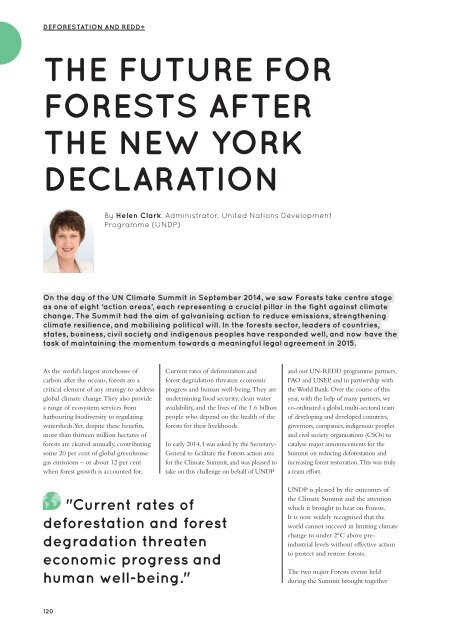Climate Action 2014-2015
You also want an ePaper? Increase the reach of your titles
YUMPU automatically turns print PDFs into web optimized ePapers that Google loves.
DEFORESTATION AND REDD+<br />
THE FUTURE FOR<br />
FORESTS AFTER<br />
THE NEW YORK<br />
DECLARATION<br />
By Helen Clark, Administrator, United Nations Development<br />
Programme (UNDP)<br />
On the day of the UN <strong>Climate</strong> Summit in September <strong>2014</strong>, we saw Forests take centre stage<br />
as one of eight ‘action areas’, each representing a crucial pillar in the fight against climate<br />
change. The Summit had the aim of galvanising action to reduce emissions, strengthening<br />
climate resilience, and mobilising political will. In the forests sector, leaders of countries,<br />
states, business, civil society and indigenous peoples have responded well, and now have the<br />
task of maintaining the momentum towards a meaningful legal agreement in <strong>2015</strong>.<br />
As the world’s largest storehouse of<br />
carbon after the oceans, forests are a<br />
critical element of any strategy to address<br />
global climate change. They also provide<br />
a range of ecosystem services from<br />
harbouring biodiversity to regulating<br />
watersheds. Yet, despite these benefits,<br />
more than thirteen million hectares of<br />
forests are cleared annually, contributing<br />
some 20 per cent of global greenhouse<br />
gas emissions – or about 12 per cent<br />
when forest growth is accounted for.<br />
Current rates of deforestation and<br />
forest degradation threaten economic<br />
progress and human well-being. They are<br />
undermining food security, clean water<br />
availability, and the lives of the 1.6 billion<br />
people who depend on the health of the<br />
forests for their livelihoods.<br />
In early <strong>2014</strong>, I was asked by the Secretary-<br />
General to facilitate the Forests action area<br />
for the <strong>Climate</strong> Summit, and was pleased to<br />
take on this challenge on behalf of UNDP<br />
and our UN-REDD programme partners,<br />
FAO and UNEP, and in partnership with<br />
the World Bank. Over the course of this<br />
year, with the help of many partners, we<br />
co-ordinated a global, multi-sectoral team<br />
of developing and developed countries,<br />
governors, companies, indigenous peoples<br />
and civil society organisations (CSOs) to<br />
catalyse major announcements for the<br />
Summit on reducing deforestation and<br />
increasing forest restoration. This was truly<br />
a team effort.<br />
"Current rates of<br />
deforestation and forest<br />
degradation threaten<br />
economic progress and<br />
human well-being."<br />
UNDP is pleased by the outcomes of<br />
the <strong>Climate</strong> Summit and the attention<br />
which it brought to bear on Forests.<br />
It is now widely recognised that the<br />
world cannot succeed in limiting climate<br />
change to under 2°C above preindustrial<br />
levels without effective action<br />
to protect and restore forests.<br />
The two major Forests events held<br />
during the Summit brought together<br />
120












